Exploring Global Citizenship, Business Purpose, AI, and Value of Life
VerifiedAdded on 2020/10/23
|6
|1539
|359
Essay
AI Summary
This essay delves into the multifaceted concepts of global citizenship, the purpose of business, the influence of artificial intelligence (AI), and the value of life. It defines global citizenship as a sense of civic responsibility and rights among world members, emphasizing community involvement and sustainable practices. The essay examines the core purpose of business, highlighting social enterprises and corporate social responsibility. It analyzes the impact of AI on the future, particularly its effect on employment and various sectors. Furthermore, the essay discusses controversial laws related to abortion, the death penalty, and assisted dying, providing a comparative overview of different legal frameworks and societal viewpoints. The paper provides references to support its arguments.
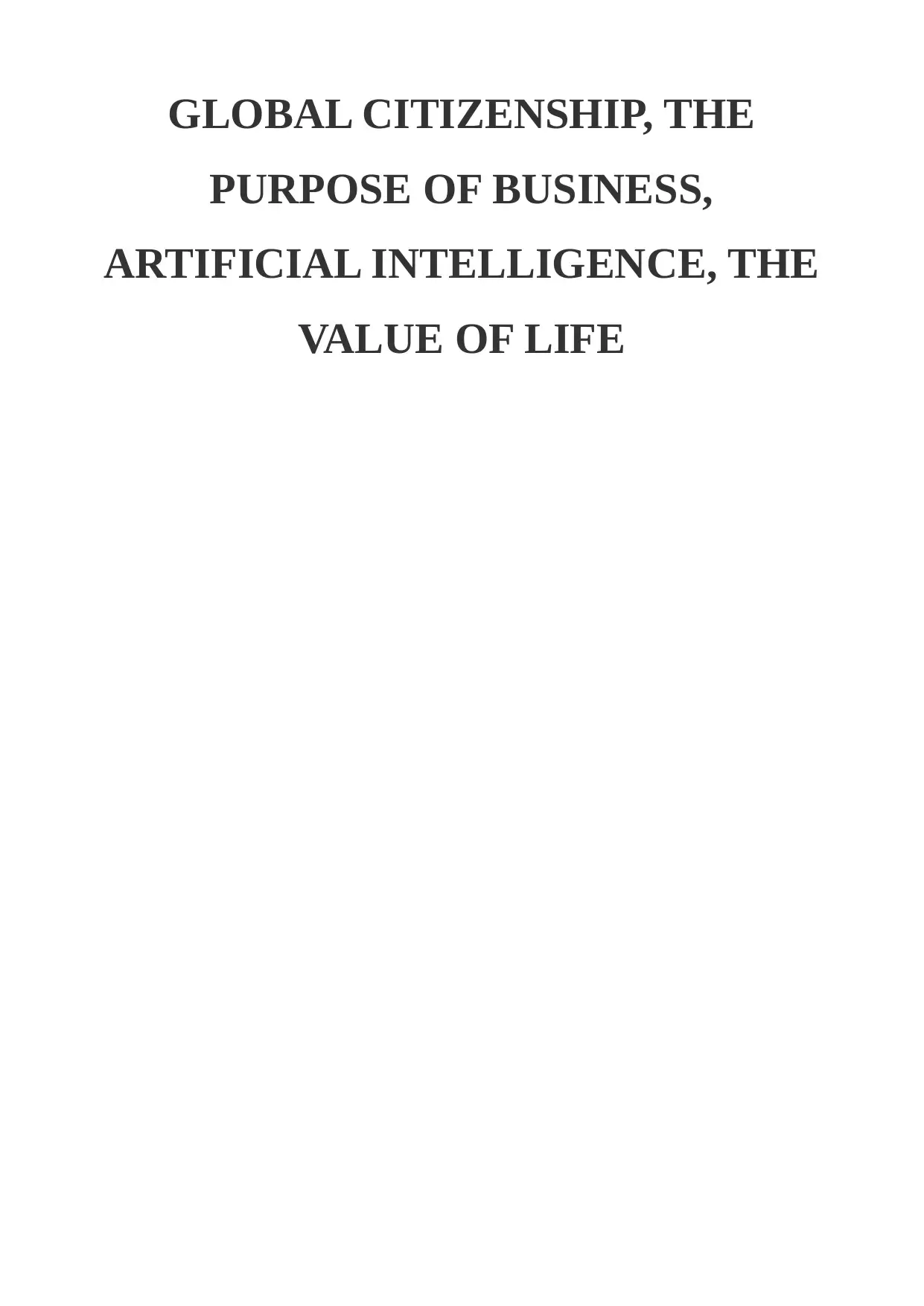
GLOBAL CITIZENSHIP, THE
PURPOSE OF BUSINESS,
ARTIFICIAL INTELLIGENCE, THE
VALUE OF LIFE
PURPOSE OF BUSINESS,
ARTIFICIAL INTELLIGENCE, THE
VALUE OF LIFE
Paraphrase This Document
Need a fresh take? Get an instant paraphrase of this document with our AI Paraphraser

Table of Contents
PART I ................................................................................................................................................3
Idea of Global Citizenship..............................................................................................................3
PART 2..................................................................................................................................................3
Purpose of business..........................................................................................................................3
PART 3..................................................................................................................................................4
Influence of Artificial intelligence in future....................................................................................4
PART 4..................................................................................................................................................4
Laws relating to abortion, the death penalty and assisted dying.....................................................4
REFERENCES.....................................................................................................................................6
PART I ................................................................................................................................................3
Idea of Global Citizenship..............................................................................................................3
PART 2..................................................................................................................................................3
Purpose of business..........................................................................................................................3
PART 3..................................................................................................................................................4
Influence of Artificial intelligence in future....................................................................................4
PART 4..................................................................................................................................................4
Laws relating to abortion, the death penalty and assisted dying.....................................................4
REFERENCES.....................................................................................................................................6
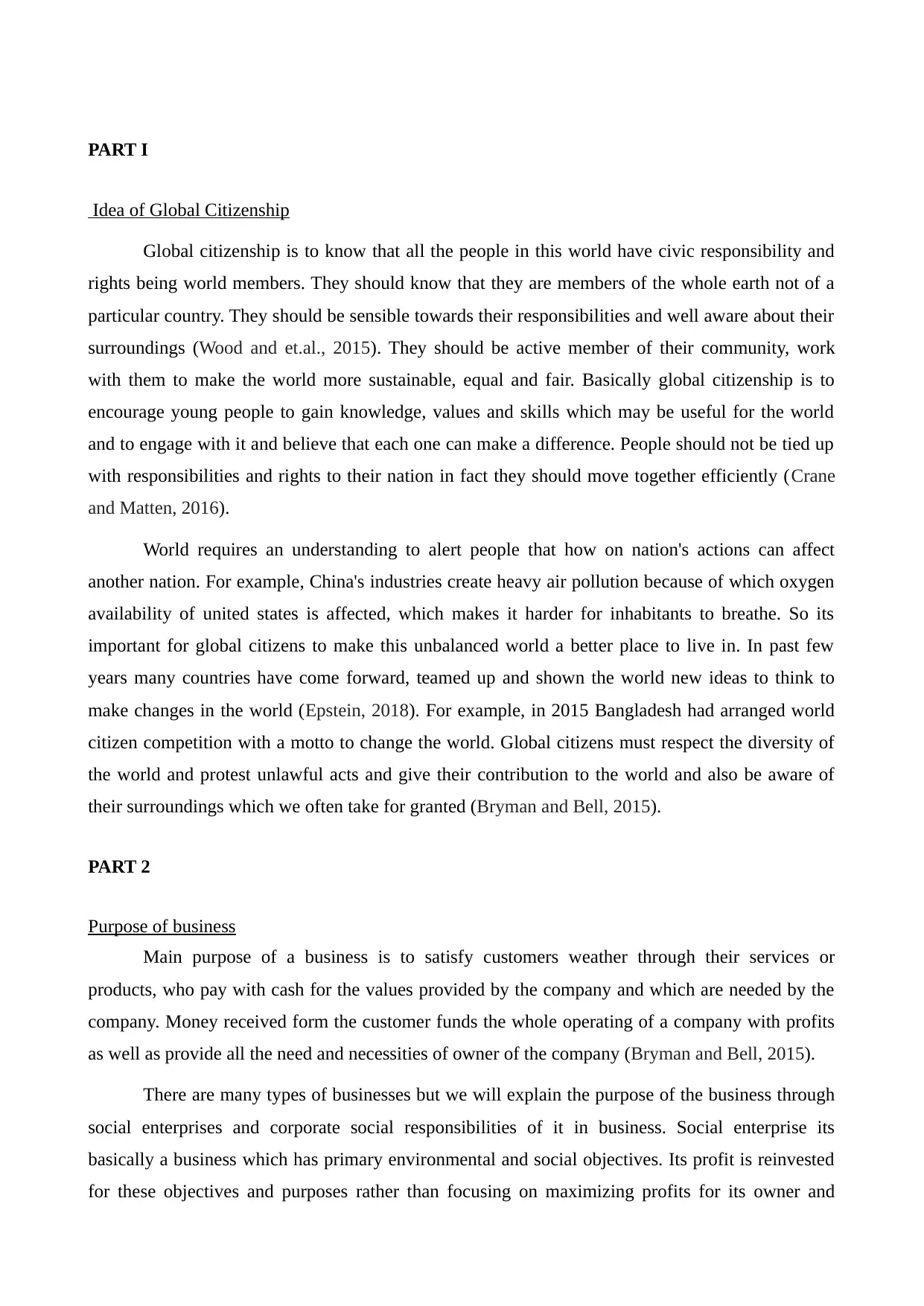
PART I
Idea of Global Citizenship
Global citizenship is to know that all the people in this world have civic responsibility and
rights being world members. They should know that they are members of the whole earth not of a
particular country. They should be sensible towards their responsibilities and well aware about their
surroundings (Wood and et.al., 2015). They should be active member of their community, work
with them to make the world more sustainable, equal and fair. Basically global citizenship is to
encourage young people to gain knowledge, values and skills which may be useful for the world
and to engage with it and believe that each one can make a difference. People should not be tied up
with responsibilities and rights to their nation in fact they should move together efficiently (Crane
and Matten, 2016).
World requires an understanding to alert people that how on nation's actions can affect
another nation. For example, China's industries create heavy air pollution because of which oxygen
availability of united states is affected, which makes it harder for inhabitants to breathe. So its
important for global citizens to make this unbalanced world a better place to live in. In past few
years many countries have come forward, teamed up and shown the world new ideas to think to
make changes in the world (Epstein, 2018). For example, in 2015 Bangladesh had arranged world
citizen competition with a motto to change the world. Global citizens must respect the diversity of
the world and protest unlawful acts and give their contribution to the world and also be aware of
their surroundings which we often take for granted (Bryman and Bell, 2015).
PART 2
Purpose of business
Main purpose of a business is to satisfy customers weather through their services or
products, who pay with cash for the values provided by the company and which are needed by the
company. Money received form the customer funds the whole operating of a company with profits
as well as provide all the need and necessities of owner of the company (Bryman and Bell, 2015).
There are many types of businesses but we will explain the purpose of the business through
social enterprises and corporate social responsibilities of it in business. Social enterprise its
basically a business which has primary environmental and social objectives. Its profit is reinvested
for these objectives and purposes rather than focusing on maximizing profits for its owner and
Idea of Global Citizenship
Global citizenship is to know that all the people in this world have civic responsibility and
rights being world members. They should know that they are members of the whole earth not of a
particular country. They should be sensible towards their responsibilities and well aware about their
surroundings (Wood and et.al., 2015). They should be active member of their community, work
with them to make the world more sustainable, equal and fair. Basically global citizenship is to
encourage young people to gain knowledge, values and skills which may be useful for the world
and to engage with it and believe that each one can make a difference. People should not be tied up
with responsibilities and rights to their nation in fact they should move together efficiently (Crane
and Matten, 2016).
World requires an understanding to alert people that how on nation's actions can affect
another nation. For example, China's industries create heavy air pollution because of which oxygen
availability of united states is affected, which makes it harder for inhabitants to breathe. So its
important for global citizens to make this unbalanced world a better place to live in. In past few
years many countries have come forward, teamed up and shown the world new ideas to think to
make changes in the world (Epstein, 2018). For example, in 2015 Bangladesh had arranged world
citizen competition with a motto to change the world. Global citizens must respect the diversity of
the world and protest unlawful acts and give their contribution to the world and also be aware of
their surroundings which we often take for granted (Bryman and Bell, 2015).
PART 2
Purpose of business
Main purpose of a business is to satisfy customers weather through their services or
products, who pay with cash for the values provided by the company and which are needed by the
company. Money received form the customer funds the whole operating of a company with profits
as well as provide all the need and necessities of owner of the company (Bryman and Bell, 2015).
There are many types of businesses but we will explain the purpose of the business through
social enterprises and corporate social responsibilities of it in business. Social enterprise its
basically a business which has primary environmental and social objectives. Its profit is reinvested
for these objectives and purposes rather than focusing on maximizing profits for its owner and
⊘ This is a preview!⊘
Do you want full access?
Subscribe today to unlock all pages.

Trusted by 1+ million students worldwide
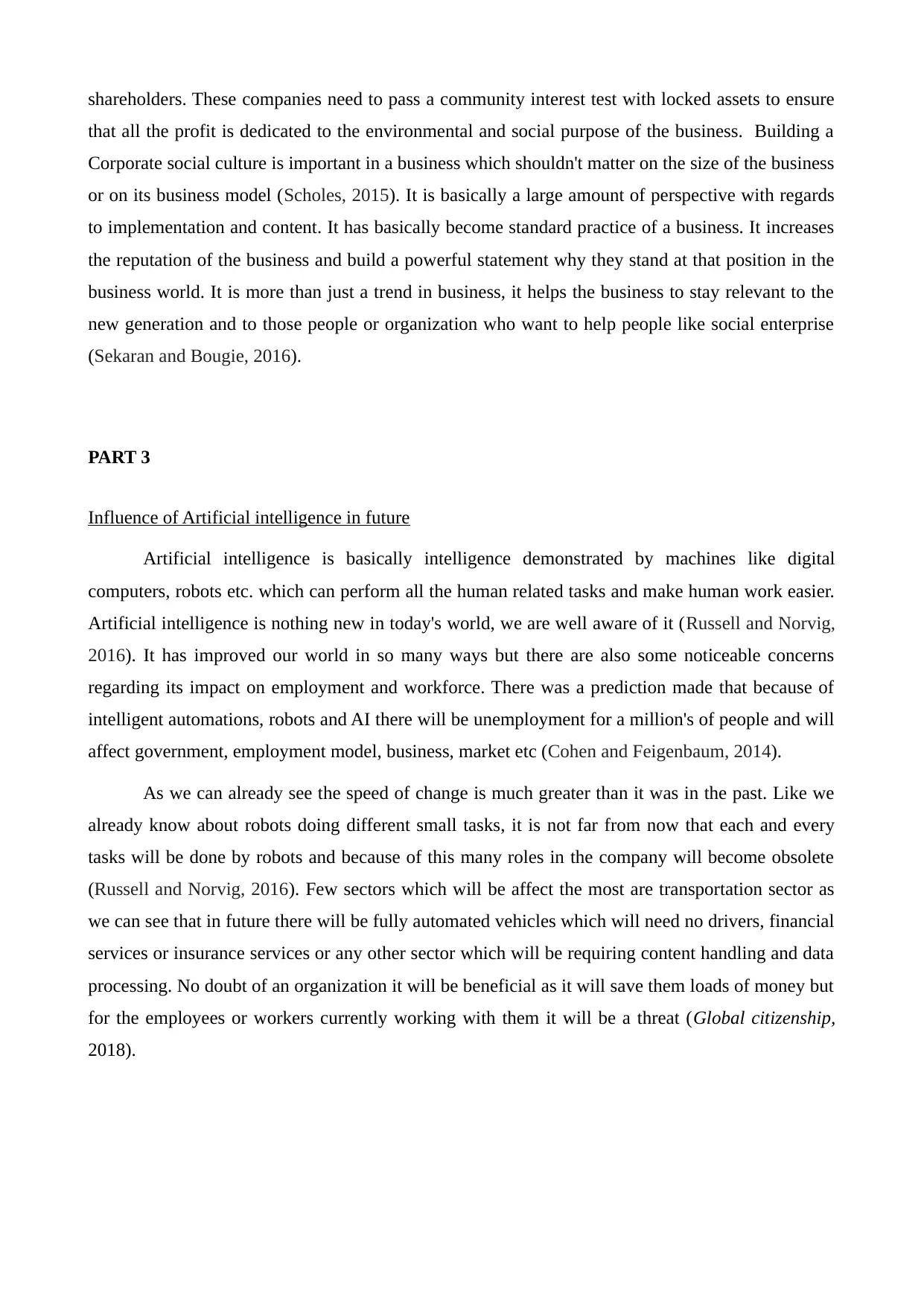
shareholders. These companies need to pass a community interest test with locked assets to ensure
that all the profit is dedicated to the environmental and social purpose of the business. Building a
Corporate social culture is important in a business which shouldn't matter on the size of the business
or on its business model (Scholes, 2015). It is basically a large amount of perspective with regards
to implementation and content. It has basically become standard practice of a business. It increases
the reputation of the business and build a powerful statement why they stand at that position in the
business world. It is more than just a trend in business, it helps the business to stay relevant to the
new generation and to those people or organization who want to help people like social enterprise
(Sekaran and Bougie, 2016).
PART 3
Influence of Artificial intelligence in future
Artificial intelligence is basically intelligence demonstrated by machines like digital
computers, robots etc. which can perform all the human related tasks and make human work easier.
Artificial intelligence is nothing new in today's world, we are well aware of it (Russell and Norvig,
2016). It has improved our world in so many ways but there are also some noticeable concerns
regarding its impact on employment and workforce. There was a prediction made that because of
intelligent automations, robots and AI there will be unemployment for a million's of people and will
affect government, employment model, business, market etc (Cohen and Feigenbaum, 2014).
As we can already see the speed of change is much greater than it was in the past. Like we
already know about robots doing different small tasks, it is not far from now that each and every
tasks will be done by robots and because of this many roles in the company will become obsolete
(Russell and Norvig, 2016). Few sectors which will be affect the most are transportation sector as
we can see that in future there will be fully automated vehicles which will need no drivers, financial
services or insurance services or any other sector which will be requiring content handling and data
processing. No doubt of an organization it will be beneficial as it will save them loads of money but
for the employees or workers currently working with them it will be a threat (Global citizenship,
2018).
that all the profit is dedicated to the environmental and social purpose of the business. Building a
Corporate social culture is important in a business which shouldn't matter on the size of the business
or on its business model (Scholes, 2015). It is basically a large amount of perspective with regards
to implementation and content. It has basically become standard practice of a business. It increases
the reputation of the business and build a powerful statement why they stand at that position in the
business world. It is more than just a trend in business, it helps the business to stay relevant to the
new generation and to those people or organization who want to help people like social enterprise
(Sekaran and Bougie, 2016).
PART 3
Influence of Artificial intelligence in future
Artificial intelligence is basically intelligence demonstrated by machines like digital
computers, robots etc. which can perform all the human related tasks and make human work easier.
Artificial intelligence is nothing new in today's world, we are well aware of it (Russell and Norvig,
2016). It has improved our world in so many ways but there are also some noticeable concerns
regarding its impact on employment and workforce. There was a prediction made that because of
intelligent automations, robots and AI there will be unemployment for a million's of people and will
affect government, employment model, business, market etc (Cohen and Feigenbaum, 2014).
As we can already see the speed of change is much greater than it was in the past. Like we
already know about robots doing different small tasks, it is not far from now that each and every
tasks will be done by robots and because of this many roles in the company will become obsolete
(Russell and Norvig, 2016). Few sectors which will be affect the most are transportation sector as
we can see that in future there will be fully automated vehicles which will need no drivers, financial
services or insurance services or any other sector which will be requiring content handling and data
processing. No doubt of an organization it will be beneficial as it will save them loads of money but
for the employees or workers currently working with them it will be a threat (Global citizenship,
2018).
Paraphrase This Document
Need a fresh take? Get an instant paraphrase of this document with our AI Paraphraser
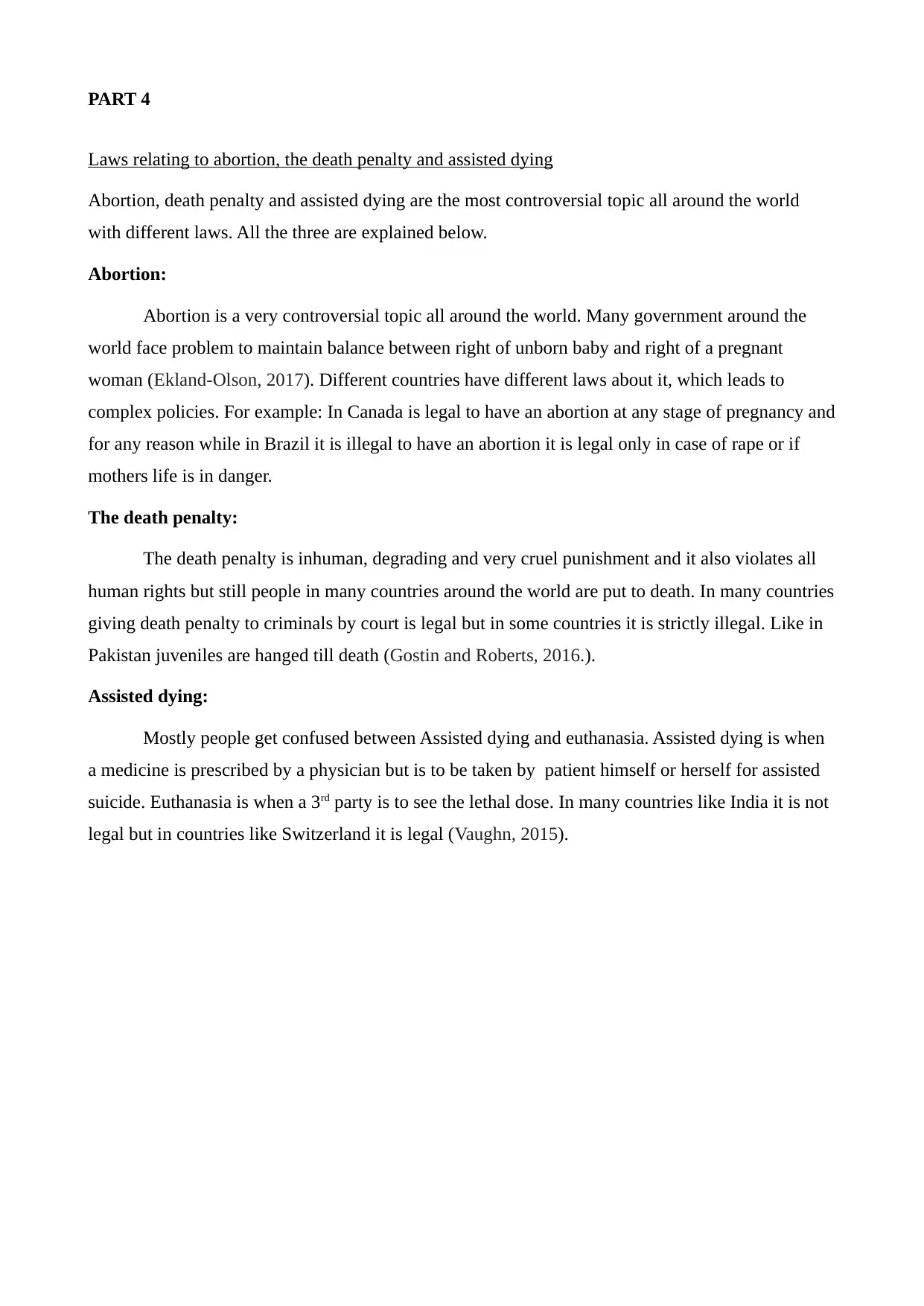
PART 4
Laws relating to abortion, the death penalty and assisted dying
Abortion, death penalty and assisted dying are the most controversial topic all around the world
with different laws. All the three are explained below.
Abortion:
Abortion is a very controversial topic all around the world. Many government around the
world face problem to maintain balance between right of unborn baby and right of a pregnant
woman (Ekland-Olson, 2017). Different countries have different laws about it, which leads to
complex policies. For example: In Canada is legal to have an abortion at any stage of pregnancy and
for any reason while in Brazil it is illegal to have an abortion it is legal only in case of rape or if
mothers life is in danger.
The death penalty:
The death penalty is inhuman, degrading and very cruel punishment and it also violates all
human rights but still people in many countries around the world are put to death. In many countries
giving death penalty to criminals by court is legal but in some countries it is strictly illegal. Like in
Pakistan juveniles are hanged till death (Gostin and Roberts, 2016.).
Assisted dying:
Mostly people get confused between Assisted dying and euthanasia. Assisted dying is when
a medicine is prescribed by a physician but is to be taken by patient himself or herself for assisted
suicide. Euthanasia is when a 3rd party is to see the lethal dose. In many countries like India it is not
legal but in countries like Switzerland it is legal (Vaughn, 2015).
Laws relating to abortion, the death penalty and assisted dying
Abortion, death penalty and assisted dying are the most controversial topic all around the world
with different laws. All the three are explained below.
Abortion:
Abortion is a very controversial topic all around the world. Many government around the
world face problem to maintain balance between right of unborn baby and right of a pregnant
woman (Ekland-Olson, 2017). Different countries have different laws about it, which leads to
complex policies. For example: In Canada is legal to have an abortion at any stage of pregnancy and
for any reason while in Brazil it is illegal to have an abortion it is legal only in case of rape or if
mothers life is in danger.
The death penalty:
The death penalty is inhuman, degrading and very cruel punishment and it also violates all
human rights but still people in many countries around the world are put to death. In many countries
giving death penalty to criminals by court is legal but in some countries it is strictly illegal. Like in
Pakistan juveniles are hanged till death (Gostin and Roberts, 2016.).
Assisted dying:
Mostly people get confused between Assisted dying and euthanasia. Assisted dying is when
a medicine is prescribed by a physician but is to be taken by patient himself or herself for assisted
suicide. Euthanasia is when a 3rd party is to see the lethal dose. In many countries like India it is not
legal but in countries like Switzerland it is legal (Vaughn, 2015).
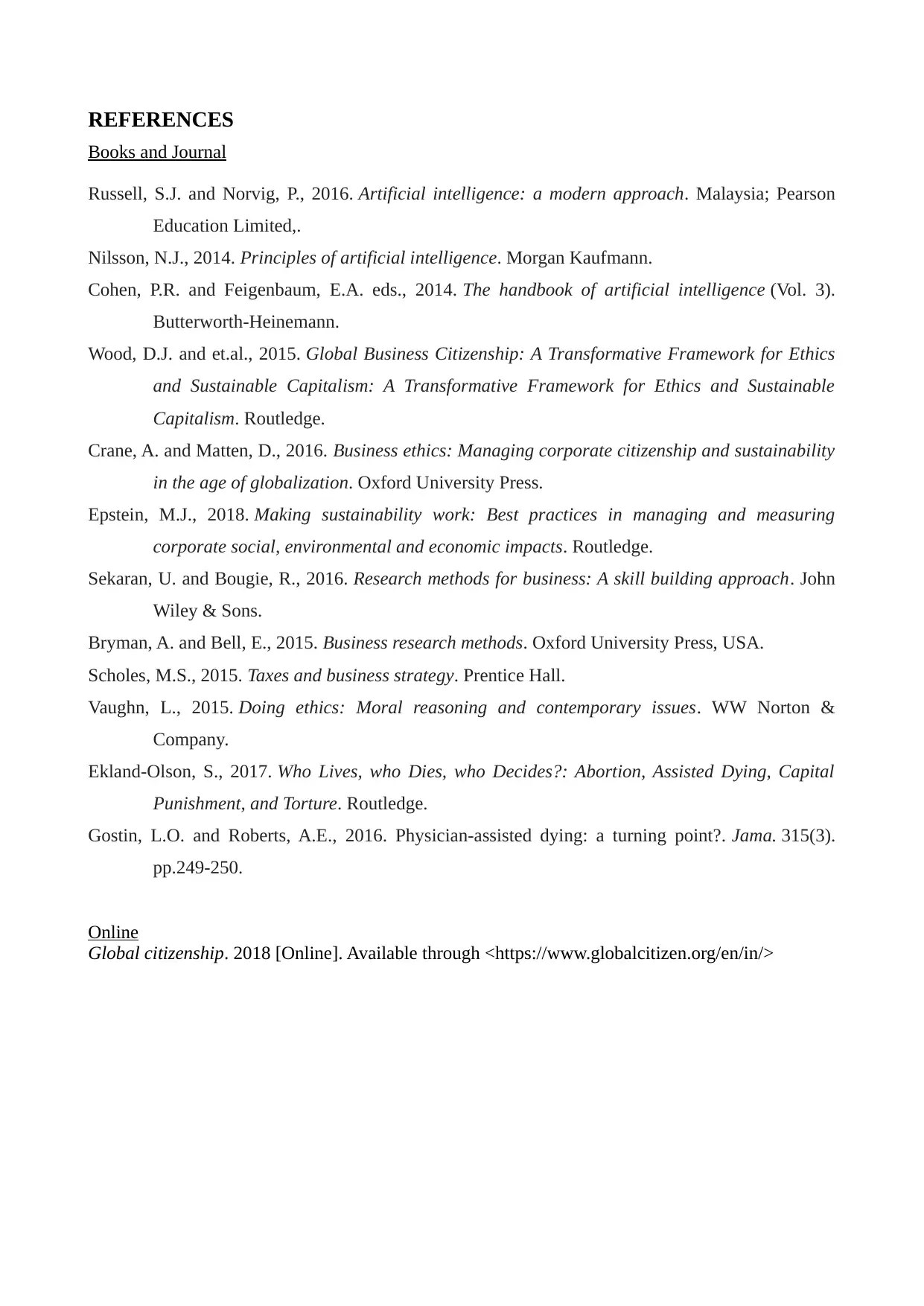
REFERENCES
Books and Journal
Russell, S.J. and Norvig, P., 2016. Artificial intelligence: a modern approach. Malaysia; Pearson
Education Limited,.
Nilsson, N.J., 2014. Principles of artificial intelligence. Morgan Kaufmann.
Cohen, P.R. and Feigenbaum, E.A. eds., 2014. The handbook of artificial intelligence (Vol. 3).
Butterworth-Heinemann.
Wood, D.J. and et.al., 2015. Global Business Citizenship: A Transformative Framework for Ethics
and Sustainable Capitalism: A Transformative Framework for Ethics and Sustainable
Capitalism. Routledge.
Crane, A. and Matten, D., 2016. Business ethics: Managing corporate citizenship and sustainability
in the age of globalization. Oxford University Press.
Epstein, M.J., 2018. Making sustainability work: Best practices in managing and measuring
corporate social, environmental and economic impacts. Routledge.
Sekaran, U. and Bougie, R., 2016. Research methods for business: A skill building approach. John
Wiley & Sons.
Bryman, A. and Bell, E., 2015. Business research methods. Oxford University Press, USA.
Scholes, M.S., 2015. Taxes and business strategy. Prentice Hall.
Vaughn, L., 2015. Doing ethics: Moral reasoning and contemporary issues. WW Norton &
Company.
Ekland-Olson, S., 2017. Who Lives, who Dies, who Decides?: Abortion, Assisted Dying, Capital
Punishment, and Torture. Routledge.
Gostin, L.O. and Roberts, A.E., 2016. Physician-assisted dying: a turning point?. Jama. 315(3).
pp.249-250.
Online
Global citizenship. 2018 [Online]. Available through <https://www.globalcitizen.org/en/in/>
Books and Journal
Russell, S.J. and Norvig, P., 2016. Artificial intelligence: a modern approach. Malaysia; Pearson
Education Limited,.
Nilsson, N.J., 2014. Principles of artificial intelligence. Morgan Kaufmann.
Cohen, P.R. and Feigenbaum, E.A. eds., 2014. The handbook of artificial intelligence (Vol. 3).
Butterworth-Heinemann.
Wood, D.J. and et.al., 2015. Global Business Citizenship: A Transformative Framework for Ethics
and Sustainable Capitalism: A Transformative Framework for Ethics and Sustainable
Capitalism. Routledge.
Crane, A. and Matten, D., 2016. Business ethics: Managing corporate citizenship and sustainability
in the age of globalization. Oxford University Press.
Epstein, M.J., 2018. Making sustainability work: Best practices in managing and measuring
corporate social, environmental and economic impacts. Routledge.
Sekaran, U. and Bougie, R., 2016. Research methods for business: A skill building approach. John
Wiley & Sons.
Bryman, A. and Bell, E., 2015. Business research methods. Oxford University Press, USA.
Scholes, M.S., 2015. Taxes and business strategy. Prentice Hall.
Vaughn, L., 2015. Doing ethics: Moral reasoning and contemporary issues. WW Norton &
Company.
Ekland-Olson, S., 2017. Who Lives, who Dies, who Decides?: Abortion, Assisted Dying, Capital
Punishment, and Torture. Routledge.
Gostin, L.O. and Roberts, A.E., 2016. Physician-assisted dying: a turning point?. Jama. 315(3).
pp.249-250.
Online
Global citizenship. 2018 [Online]. Available through <https://www.globalcitizen.org/en/in/>
⊘ This is a preview!⊘
Do you want full access?
Subscribe today to unlock all pages.

Trusted by 1+ million students worldwide
1 out of 6
Related Documents
Your All-in-One AI-Powered Toolkit for Academic Success.
+13062052269
info@desklib.com
Available 24*7 on WhatsApp / Email
![[object Object]](/_next/static/media/star-bottom.7253800d.svg)
Unlock your academic potential
Copyright © 2020–2026 A2Z Services. All Rights Reserved. Developed and managed by ZUCOL.





